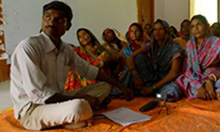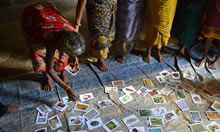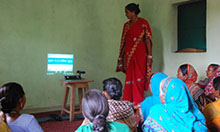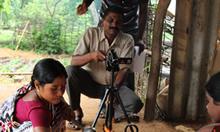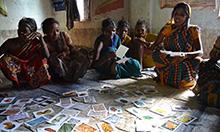SPRING’s work in India supports the design and implementation of a five-year randomized control trial (RCT), funded by the Bill and Melinda Gates foundation and the UK Department for International Development (DFID). The project, known as Upscaling Participatory Action and Videos for Agriculture and Nutrition (UPAVAN), is led by the London School of Hygiene and Tropical Medicine (LSHTM), with partners Digital Green (DG), Ekjut, JSI Research & Training Institute, Inc., University College London (UCL), and the Voluntary Association for Rural Reconstruction and Appropriate Technology (VARRAT). USAID, through SPRING, provided additional financial support for the formative research, Maternal Infant and Young Child Nutrition (MIYCN), and nutrition-sensitive agriculture trainings, and initial video development portion of this trial.
UPAVAN is testing the effectivness of SPRING’s and Digital Green’s community video approach in Odisha to promote improved nutrition practices by mediating disseminations of community-made videos at women’s self help groups. In 2016, SPRING led formative research using participatory qualitative methods to explore community members’ knowledge, attitudes, and current practices related to agriculture, income, nutrition, and their local food, health, WASH, and care environment. SPRING used the formative research findings to inform development of trainings on maternal, infant, and young child nutrition (MIYCN) and nutrition-sensitive agriculture for community service providers and community resource people who screen and discuss the videos. The formative research report is available now, and the community training packages will be available online soon.
Throughout 2017, SPRING has supported UPAVAN program planning, including developing a seasonal calendar with monthly video topics, rolling out community trainings, local production and dissemination of nutrition-sensitive agriculture and MIYCN videos, and program monitoring. Ongoing monitoring and evaluation efforts will be disseminated by UPAVAN to continue building the evidence base for effective nutrition-sensitive agriculture and MIYCN approaches, and to inform future efforts in this field.
The UPAVAN work builds on our previous collaboration with Digital Green, when we married local video production to SPRING's expertise in behavior change approaches to promote improved nutrition in the first 1,000 days, reaching new audiences through mobile video screenings and facilitated discussions, with adoptions of key behaviors verified through home visits. The work of SPRING in India spread across 30 villages in the Keonjhar district of Odisha State, and included both government and NGO collaborators, as well as the International Food Policy Research Institute (IFPRI) and Save the Children/India.
View our feasibility study for impact and scale-up and other related information below.
